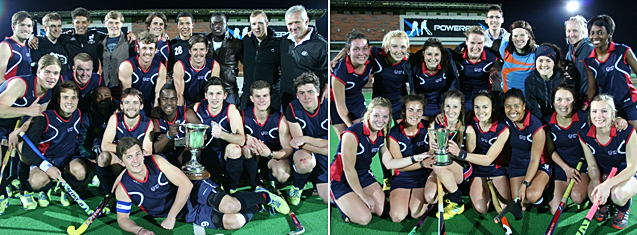During the first weekend of August 2014, the University of the Free State (UFS) was once again crowned as the Free State hockey champions.
In the finals of the Free State championships, the Kovsies’ women’s team beat the Reds (Kovsies 2nd team) by 10-1. This is the ninth consecutive year that our women’s team walk away as champions. It was clear from the start that Kovsies wouldn’t be satisfied by anything less than a win and a courageous Reds team was unable to cover all the gaps.
After being at the helm for three years, the Kovsies’ coach, Jacques du Toit, announced his retirement after the game. During his coaching term, Kovsies had their best performances since the 1984 season – when the Kovsie women won the University Sports South Africa (USSA) tournament.
Since 2012, the Kovsies’ women’s team went from strength to strength. For the first time since 1993, they ended among the top four teams in the USSA tournament that year. In the following year they repeated this performance and also achieved a bronze during the first Varsity Sport Hockey tournament for women.
Kovsies’ men’s hockey team was also crowned as champions in the Free State championships for the 12th consecutive year. We won against the Central University of Technology in the finals by 9-2. This year our team of champions also succeeded in breaking a medal drought of 30 years in the USSA tournament. We defeated the team from the University of Johannesburg to gain a bronze.
This year, Kovsies was also the only university that managed to win two medals at the USSA hockey tournament and can rightfully claim the title as best tertiary hockey club in the country.
 Kovsies’ men’s team: Back, from the left are: Brad Hensberg, Rogan Jones, Mikhail Mannel, Egon van der Merwe, Stanley de Villiers,
Cheslyn Neethling, Michael Baiden, Richard Copley (physio) and Braam van Wyk (coach). Centre, from the left are: Darryl Sutherland,
Ian Finlay, Gerald van Blerk and Dylan Swanepoel (vice-capt). Front, from the left, are: Jaco Fourie, Qhayiya Jack, Berne Burger, Nazo
Mlakalaka, Kurt Hensberg, Lehan Bloemhoff and Ruan Kleinhans.
Kovsies’ women’s team: Back, from the left are: Madie Wessels, Izelle Lategan, Nisa van Zyl, Timon Botha, Jacques du Toit, Beatrix
Wesstdyk, Jacqie Ras, Jo Nelka Swanepoel and Lisa Hawker. Front, from the left are: Nicole Walraven, Tanya Britz, Line Malan (capt),
Minjon van Tonder (vice-capt), Kim Mentor, Inke Wolmarans and Cornelle Botha. |